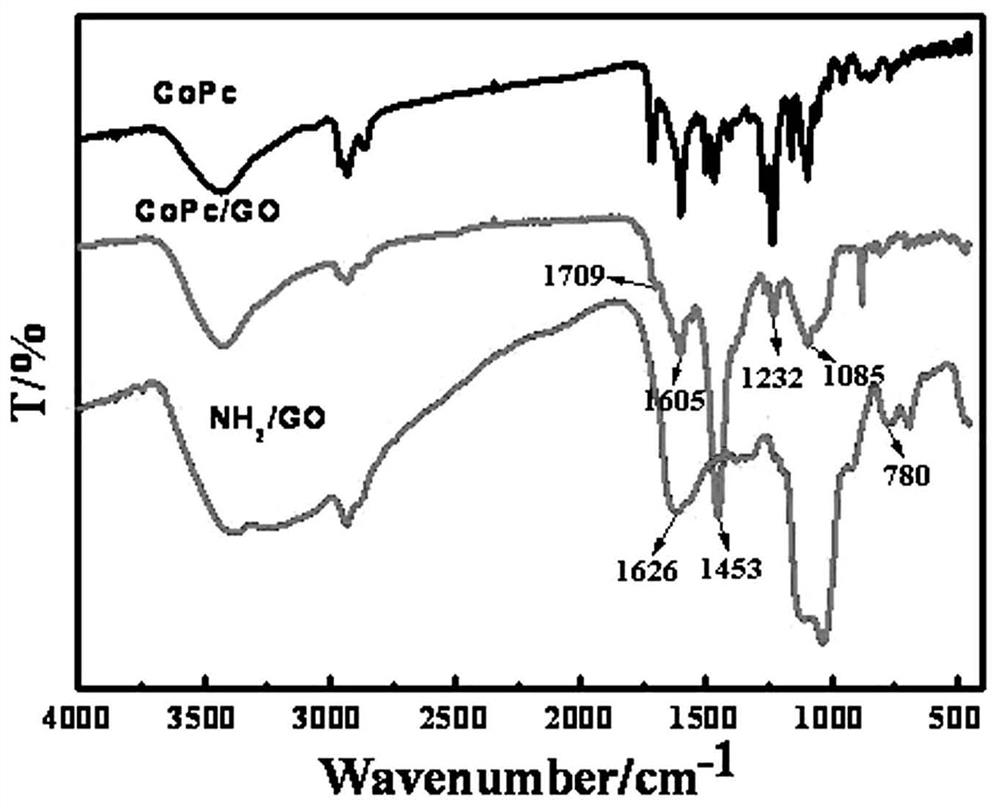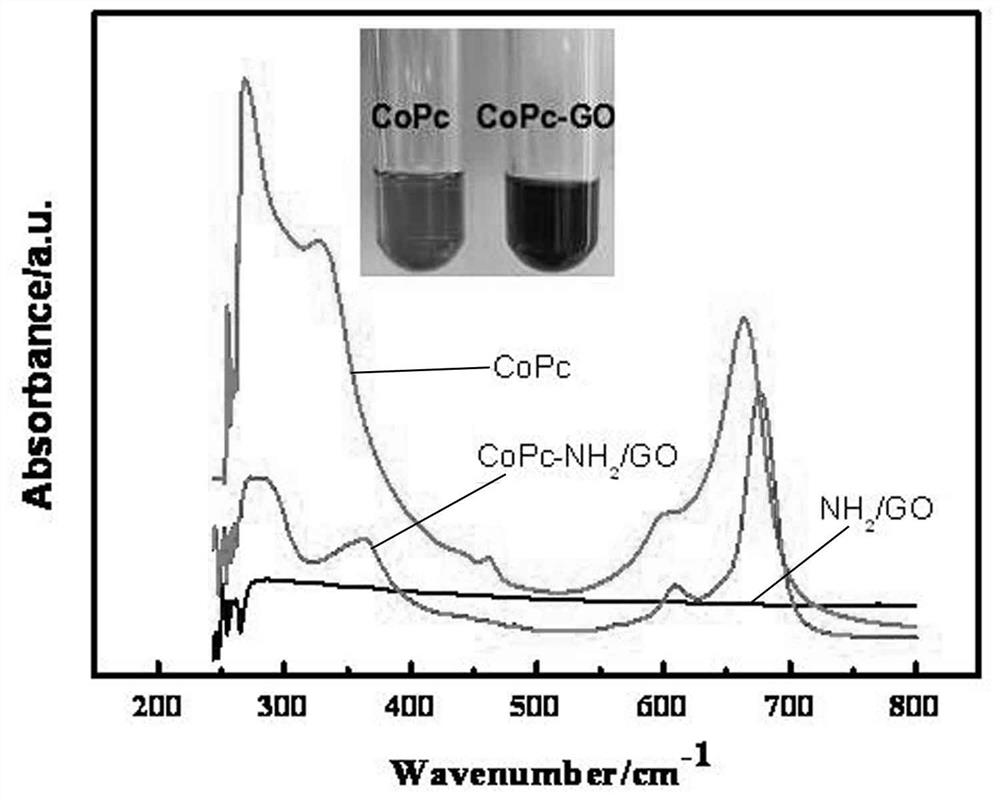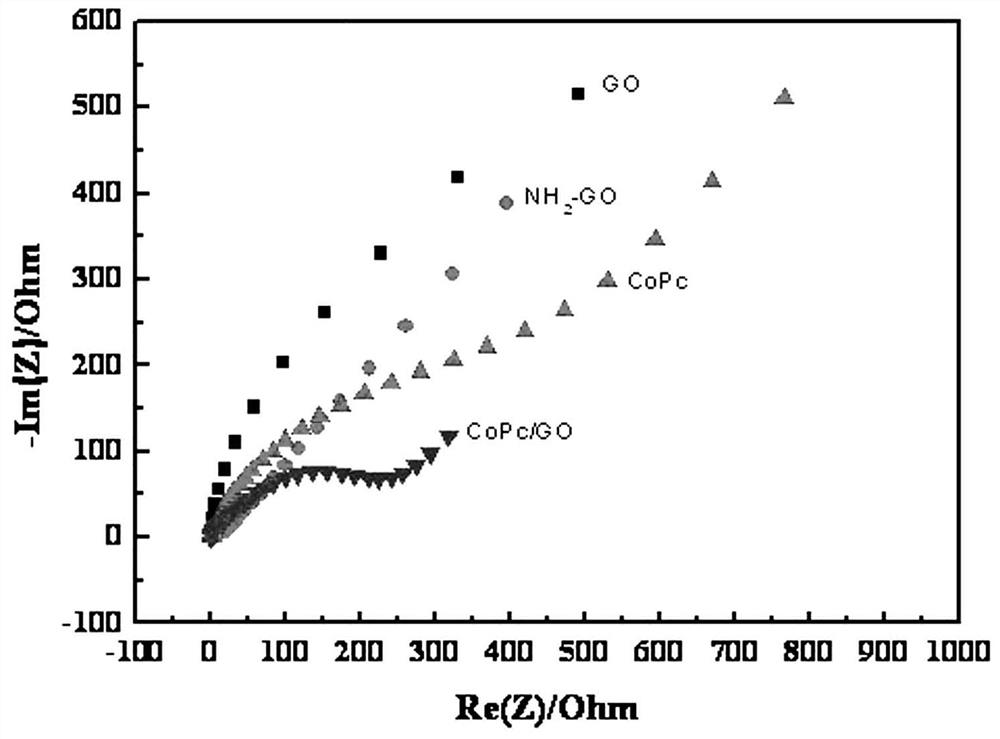A kind of graphene oxide covalently immobilized metal phthalocyanine catalyst and its preparation method and application
A metal phthalocyanine and catalyst technology, which is applied in the field of graphene oxide supported photocatalysts, can solve problems such as weak binding force, weak stability of composite materials, and affecting performance, so as to improve electrical conductivity, improve firmness, and improve dispersion sexual effect
- Summary
- Abstract
- Description
- Claims
- Application Information
AI Technical Summary
Problems solved by technology
Method used
Image
Examples
Embodiment 1
[0026] The first step, the preparation of (4-formylphenoxy) phthalonitrile: add 1.73 g (10 mmol) 4-nitrophthalonitrile, 2.44 g (20 mmol) p-hydroxy Benzaldehyde, 20 mL of solvent N-N dimethylformamide and 1.0 g of catalyst anhydrous K 2 CO 3 , keep the temperature at 80°C for 3 h, after the reaction is complete, pour the solution into an ice-water bath, let it stand still to precipitate a precipitate, filter it with suction, recrystallize from acetone, and dry it to obtain (4-formylphenoxy)phthalonitrile.
[0027] The second step, the preparation of tetra-β-(4-formylphenoxy) cobalt phthalocyanine: 0.496 g (2 mmol) (4-formylphenoxy) phthalonitrile and 0.26 g (2 mmol ) Anhydrous cobalt chloride was dissolved in 20 mL of n-amyl alcohol, heated to 90 °C, then 2 mL of DBU was added, and the temperature was raised to 140 °C for 24 h, and the reaction liquid was poured into 60 mL of ethanol and 180 mL of water (V:V=1 :3) in the mixed solution, let stand, and filter to obtain tetraki...
Embodiment 2
[0031] The first step, the preparation of (4-formylphenoxy) phthalonitrile: add 1.90 g (11 mmol) 4-nitrophthalonitrile, 2.56 g (21 mmol) p-hydroxy Benzaldehyde, 23 mL of solvent N-N dimethylformamide and 1.1 g of catalyst anhydrous K 2 CO 3 , constant temperature at 60°C for 4 h, after the reaction is complete, pour the solution into an ice-water bath, let it stand still to precipitate a precipitate, filter with suction, recrystallize from acetone, and dry to obtain (4-formylphenoxy)phthalonitrile.
[0032] The second step, the preparation of tetra-β-(4-formylphenoxy)iron phthalocyanine: 0.5346 g (2.2 mmol) (4-formylphenoxy) phthalonitrile and 0.38 g (2.2 mmol ) ferrous acetate was dissolved in 18 mL of n-amyl alcohol, heated to 100 °C, then added 2.16 mL of DBU, heated to 130 °C for 24 h, and the reaction solution was poured into 70 mL of ethanol and 210 mL of water (V:V=1: 3) in the mixed solution, stand still, and filter to obtain tetra-β-(4-formylphenoxy)iron phthalocyan...
Embodiment 3
[0036] The first step, the preparation of (4-formylphenoxy) phthalonitrile: add 0.21 g (12 mmol) 4-nitrophthalonitrile, 2.69 g (22 mmol) p-hydroxy Benzaldehyde, 24 mL of solvent N-N dimethylformamide and 1.2 g of catalyst anhydrous K 2 CO 3 , constant temperature at 80 ℃ for 5 h, after the reaction is complete, pour the solution into an ice-water bath, let it stand still to precipitate a precipitate, filter with suction, recrystallize from acetone, and dry to obtain (4-formylphenoxy)phthalonitrile.
[0037] The second step, the preparation of tetra-β-(4-formylphenoxy) manganese phthalocyanine: 0.5589 g (2.3 mmol) (4-formylphenoxy) phthalonitrile and 0.40 g (2.3 mmol ) Manganese acetate was dissolved in 19 mL of n-amyl alcohol, heated to 90 °C, then 2.25 mL of DBU was added, and the temperature was raised to 120 °C to react for 25 h, and the reaction liquid was poured into 80 mL of ethanol and 240 mL of water (V:V=1:3 ) in the mixed solution, let it stand, and filter to obtai...
PUM
 Login to View More
Login to View More Abstract
Description
Claims
Application Information
 Login to View More
Login to View More - R&D Engineer
- R&D Manager
- IP Professional
- Industry Leading Data Capabilities
- Powerful AI technology
- Patent DNA Extraction
Browse by: Latest US Patents, China's latest patents, Technical Efficacy Thesaurus, Application Domain, Technology Topic, Popular Technical Reports.
© 2024 PatSnap. All rights reserved.Legal|Privacy policy|Modern Slavery Act Transparency Statement|Sitemap|About US| Contact US: help@patsnap.com










